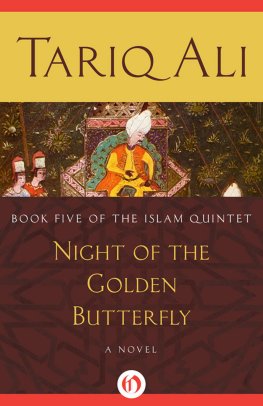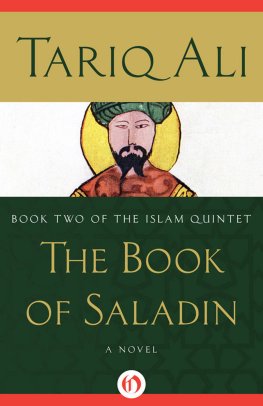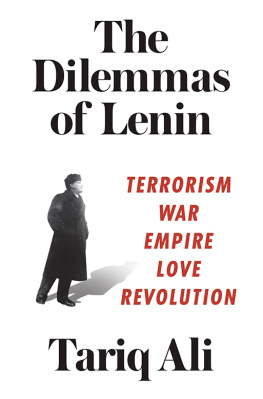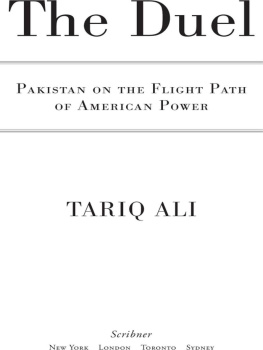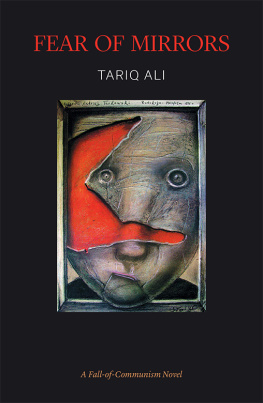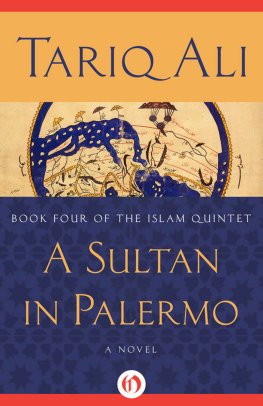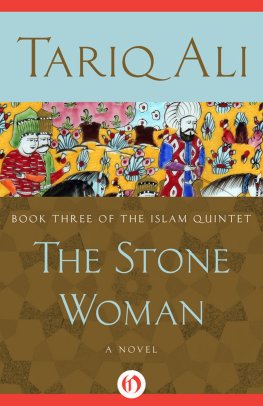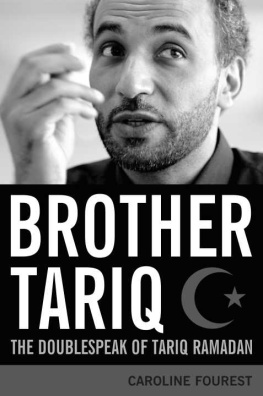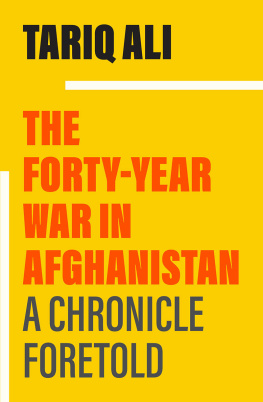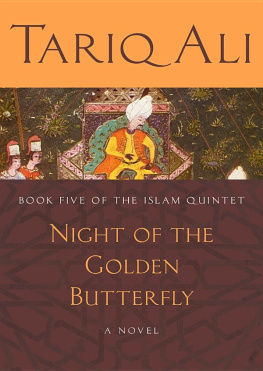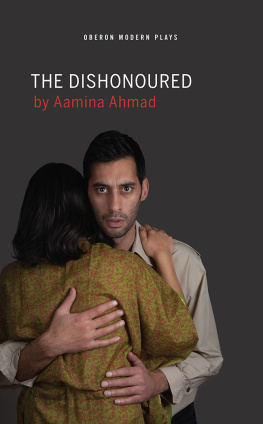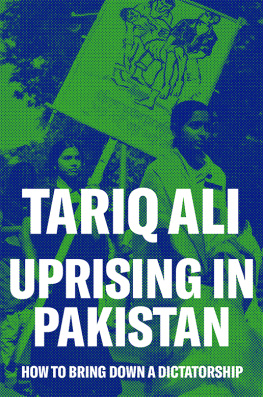Tariq Ali
Night of the Golden Butterfly
For Aisha,
who suggested the title twelve years ago and now thinks it unsuitable
FORTY-FIVE YEARS AGO, when I lived in Lahore, I had an older friend called Plato, who once did me a favour. In a fit of youthful generosity, I promised to return it with interest if and whenever he needed my help. Plato taught mathematics at a posh school, but hated some of his pupils, the ones he said were there only to learn the fine art of debauchery. And being a Punjabi Plato, he asked whether I would repay his favour with compound interest. Foolishly, I agreed.
I was in love, much to Platos annoyance. In his eyes love was simply an excuse for juvenile lechery and, by its very nature, could never be eternal. A chaste friendship was much more important and could last a lifetime. I wasnt in the mood for this type of philosophy at the time and would have signed any piece of paper he laid in front of me.
For a man whose judgements were usually strong and clear, Platos dislikes could be irrational and the border that separated his irony from his hatred was always blurred. He would, for instance, be deeply offended by students who clipped their fountain pens to the front pockets of their nylon shirts during the summer months. When asked why, he did not respond, but when pressed would mutter that if these were their aesthetic values while in the flower and heat of their youth, he feared to think what values they would espouse when they grew older. Even though this is not a good example of it, it was his wit that first drew one to him, long before he became known as a painter.
Once, a friend of ours who had recently graduated and had been inducted into the foreign service sat down at our table, only to be confronted by Plato: Im going to change my name to Diogenes so I can light a lantern in the daylight and go in search of honest civil servants. Nobody laughed, and Plato, accustomed to being the hero of every conversation, left us for a while; the target of his barb asked how we could mingle with such a foul creature. We turned on him: How dare he speak in this fashion, especially as we had defended him? And anyway, muttered my friend Zahid, Plato was worth ten foreign-office catamites like him. A few more reflections along similar lines and the figure rapidly escalated to at least a hundred foreign-service catamites and braggarts like him. That got rid of him. Then Plato returned and sat pensively for the rest of the afternoon, tugging at his black moustache at regular intervals, always a sign of anger.
The manner in which Plato discussed his amorous conquests with close friends was never totally convincing. His sexuality had always remained a mystery. He was often withdrawn and secretive and it was obvious that he had depths that we, a generation younger, could never hope to penetrate. There is much about him that I still do not know, though for almost a decade I was probably his closest friend. If only mirrors could reflect more than a clear and unwavering image. If we could also see the innermost character of the person gazing at his own reflection, the task of writers and analysts would become much easier, if not redundant.
Plato never projected any extravagant self-image, and he always made a big deal of avoiding publicity, but in a fashion that sometimes led him to step right back into the limelight. When in windy phrases one of the older and highly respected Urdu poets who regularly assembled in the Pak Tea House on the Mall exceeded the limits of self-praise, Plato would mock him without mercy, hurling epithets and Punjabi proverbs that amused us greatly but made the poets nervous. When the poet under attack suddenly turned hard and contemptuous and denounced Plato as a mediocrity, jealous of his superiors, Plato would become extremely cheerful and insist on a test so that all assembled could determine which of his opponents poems were second- and third-rate. He would begin to recite one of the more obscure verses in a hilariously hideous fashion, and when the poet and his sycophants left, Plato applauded loudly. He never really believed that the poet in question was a bad poet, not even for a moment, but he was annoyed by the narcissism and mutual-admiration sessions that took place in the teahouse every day. He hated the vacant expressions that marked the faces of the sycophants who shouted wonderful to each and every line that was recited. Like many of us, he did not fully appreciate what some of them had gone through in the preceding decades. Disappointments had worn many of them down, drained their strength, and some were now broken reeds, frittering away their energies in cafes and acting as cheerleaders for those who had acquired reputations in the literary world. Plato was well aware of this, but his own central core, a wiry steel rod, had remained unbent, and this made him intolerant towards others less strong than he was.
What had caused Plato to demand his pound of flesh now, and why in the shape of a novel based on his life? For that is what happened. A certain chain of events triggered a phone call conveying a request that I ring him in Karachi. This was odd in itself, since Plato had always loathed Fatherlands largest city, denouncing it intemperately as a characterless, hybrid monstrosity. When we spoke, he was in no mood for a lengthy conversation, merely insistent that old debts of honour had to be repaid. I had no other choice. I could, of course, have told him to get lost and I now wish I had. Not so much because of him, but because of others whose stories intersected with his. The mystery bothered me. What was it that had tightened itself into a knot in him so rock-hard that the only way of undoing it was by calling in a barely remembered debt? Was it a nagging discontent over what he had not managed to achieve, or simply the tedium of artistic endeavour in a country where the vagaries of the art market were determined by what appeared in the New York or London press? Praise abroad, profits at home.
Long before I began the awkward task of composition I would have to research certain aspects of his life, and it was not going to be smooth sailing, either. Plato had kept large tracts of his life hidden from view, or perhaps repressed them. Either way, cataracts lay ahead. How could I write about him unless he let me uncover his dormant past?
Friendships are ridiculously mobile. They flow, change, disappear, go underground mole-like for long spells and are easily forgotten, especially if one friend has shifted continents. During a lifetime we are surrounded by people in clusters, some of whom crystallize into friends of the moment, then melt away, vanish without trace, to be encountered again by accident in the strangest of places. Some political or work friendships endure much longer; a few last forever.
When I agreed to write his story, Plato was thrilled and roared triumphantly. This laughter was so unlike him that I was slightly unnerved. Irritated by my attempt to unearth the reason for this strange request, he added a rider. I would do as he asked, he knew that, but could I do so without employing any of the cunning devices or overblown phrases considered obligatory these days? It must be plain storytelling, without frills or too many digressions. I agreed, but warned him that I couldnt write a book that was only about him. He was the best person to do that, and could simply dictate a memoir if that was what he wanted. Nor could I simply portray his development in terms of his interactions with other people. The period would have to be evoked, the social milieu excavated, and navel-gazing resisted. I reminded him of Heraclitus: Those who are awake have a world in common, but every sleeper has a world of his own.
Plato accepted this gracefully, but couldnt resist sharing a thought in return, I suppose, to encourage me. A setback, he informed me, could be transformed into a victory through a work of art. I disagreed very strongly. Artistic consciousness, even at a high level, could never roll back the realities imposed on a society after a historic defeat. His voice grew louder as he responded by naming painters and poets whose work, in bad times, had lifted the people to unimagined heights. They had done so, I agreed, they had enriched the cultural life of the poor and the defeated by providing them with a useful cultural prop, but that changed nothing. The world of visual art and the realm of literature remained tiny islands. The sharks still controlled the oceans. He became angry. He was working on a triptych that would be a call to arms. He would prove me wrong. His work would set Fatherland on fire. I expressed scepticism.

